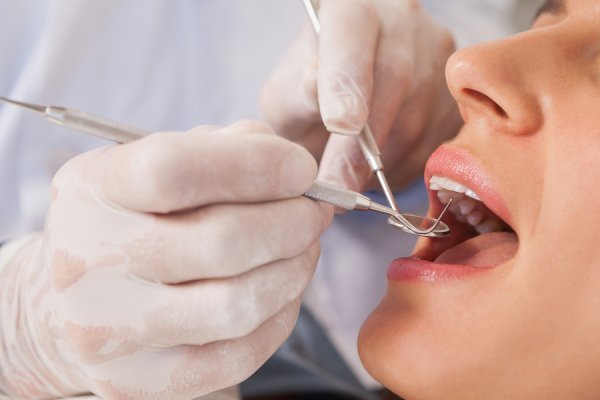-
When Are Root Canals Necessary?
 Root canals are common procedures used to save a tooth that is decayed or damaged. Although the procedure has a reputation for causing anxiety in dental patients, in reality, most find it to be similar to having a filling. If you have questions about root canals in St. Louis, talk to your dentist about what to expect during your procedure. Here are some of the reasons why your family dentist may recommend a root canal.
Root canals are common procedures used to save a tooth that is decayed or damaged. Although the procedure has a reputation for causing anxiety in dental patients, in reality, most find it to be similar to having a filling. If you have questions about root canals in St. Louis, talk to your dentist about what to expect during your procedure. Here are some of the reasons why your family dentist may recommend a root canal.Deep Cavities
In some cases, cavities can be treated with a dental filling. However, when the decay is deep in the tooth, a root canal may be necessary. Your dentist will recommend a root canal if the decay has infected the pulp of your tooth. Performing a root canal allows your dentist to remove the decay completely, so that it doesn’t affect your jaw or neighboring teeth. Note that the level of pain associated with your decayed tooth is not an indication of how deep the decay is. In some cases, very deep decay may not cause pain.Abscesses
If the pulp of your tooth becomes decayed and dies, a pus pocket may form at the end of the root. The abscess will continue to collect pus and grow, and it may form a pimple-like bump on the gums. Left untreated, an abscess will grow and cause an infection in the jaw bone and surrounding tissue that could lead to tooth loss. Your dentist can clean out the bacteria that are causing the abscess by performing a root canal.Trauma
If your tooth is hit with force, the nerve at the end of the root could be severed. As a result, the root will die. Likewise, if a fracture occurs, it could extend to the pulp. After a trauma, a root canal procedure with a crown can be used to restore the tooth. In some cases, the effects of a trauma aren’t seen until many years after an accident, when a root canal becomes necessary.If you are experiencing symptoms of severe tooth decay, a dentist can help you determine if you need a root canal. At West County Dental, Dr. Spalitto and his team are ready to provide the family dentistry services you need. To schedule an appointment, please call (314) 821-2712.
-
Tips for Caring for Your Teeth In Your Senior Years

As you age, your risk increases for developing dental problems, such as gum disease, tooth decay, and tooth loss. You can minimize this risk by caring for your teeth at home by brushing and flossing regularly, and visiting a dentist near you in St. Louis for professional cleanings and dental care checkups. To avoid costly cosmetic dentistry procedures in the future, follow these tips for caring for your teeth in your senior years.
Keep an Eye Out for Oral Health Issues
Seniors are more vulnerable to certain oral health issues, such as dental cavities, tooth decay, periodontal disease, and dry mouth. These problems can develop or become exacerbated by health problems and lifestyle choices. Certain medications can cause dry mouth, increasing your risk of tooth decay, periodontal disease, and tooth loss. A poor diet, poor dental care, and smoking can also contribute to these risks. If you notice symptoms of any oral health issues, visit Dr. Spalitto and his team as soon as possible. Keeping up with your dental health also improves your quality of life! Being able to keep healthy teeth for longer gives you the ability to keep more teeth and eat what you enjoy!Visit the Dentist Regularly
Regular visits to the dentist provide you with an opportunity for a professional oral health screening. Your dentist will look for signs of periodontal disease, cavities, and oral cancer. If these issues are caught early enough, you may be able to keep your natural teeth. Without proper dental care from a dentist, however, and you may need to undergo a root canal procedure or tooth extraction.Seek Cosmetic Dentistry Procedures When Necessary
If your tooth becomes severely damaged due to injury, cavities, tooth decay, or periodontal disease, your dentist may have to perform a tooth extraction. You shouldn’t wait too long before turning to cosmetic dentistry procedures to replace a missing tooth. The longer you have a gap in your teeth, the more your remaining teeth will begin to shift out of alignment to fill the gap. A cosmetic dentist can replace your missing tooth with a dental implant or dentures. A dentist who practices sedation dentistry can even administer medication that will help you relax during the dental surgery.Dr. Spalitto is the dentist on staff for a local nursing and rehabilitation care center, and is very in tune with caring for seniors and their dental health!
-
The Signs of Periodontal Disease

Periodontal disease, or gum disease, is a condition that can result from poor oral hygiene and infrequent visits to the dentist. If left untreated, it can cause serious dental problems, and can even require tooth extraction. To prevent periodontal disease from developing, you must practice excellent oral hygiene at home, and visit your dentist regularly for professional dental care. If you’re concerned that you’re suffering from periodontal disease in St. Louis , keep reading to learn about the signs and symptoms.
Tender, Red, Inflamed Gums
The first symptoms of gum disease can be tenderness, redness, and inflammation of the gums, but another sign is when the dentist measures your gums they find bleeding. This occurs due to poor oral hygiene. Brushing and flossing regularly removes harmful plaque and bacteria from your mouth. If you don’t practice good dental care, the plaque on your teeth hardens into tartar. Tartar harbors harmful bacteria that can cause painful infections in the gums. Once you have tartar buildup, it can only be removed by a visit to a dentist near you for a professional teeth cleaning. Be aware that pain isn’t always a sign of periodontal disease, which is why it’s important to see your dentist so he can look for bleeding when measuring your gums.Gingivitis
If tartar is not removed, you may develop a condition called gingivitis. Gingivitis is a mild form of gum disease, and dentists consider it the precursor to full periodontal disease. If you have symptoms of gingivitis, such as bleeding gums, intensely bad breath, sores in your mouth, or pus between your gums and teeth, you should visit a dentist immediately. When caught early enough, a dentist can offer treatment that prevents gingivitis from progressing into gum disease. Gingivitis is also not always associated with pain, which is why it is important to have regular visits to the dentist. Don’t wait for something to hurt!Receding Gums and Tooth Pain
In the final stages of gum disease, you’ll experience receding gums and tooth pain. As the infection in your gums spreads, it causes the gums to begin pulling away from your teeth, forming loose pockets. This may change the way your dentures fit, and can cause your natural teeth to lose proper support and structure. Without treatment, you’ll experience bone loss and tooth loss. A severe case of periodontal disease necessitates tooth extraction. Your dentist will then have to replace your missing teeth with dentures or dental implants.You feel you may be at risk for periodontal disease, come visit Dr. Spalitto at West County Dental!
RECENT POSTS
categories
- Uncategorized
- crowns
- dental veneers
- dentists
- full service dental practice
- porcelain veneers
- same day crowns
- Dental Cosmetic Surgery
- Dental Implants
- Dentistry
- Dentist Review
- Laser Dentistry
- Root Canal
- Sedation Dentistry
- Dentures
- Cleanings
- Teeth Whitening
- Abscessed Teeth
- Cosmetic Dentistry
- Infographic
- Cavities
- Sealants
- Gum Recession
- Periodontal Disease
- Dental Health
- Family Dentistry
- Dental Emergency
- Invisalign
- Filling
- Same Day Dental Procedures
- Gum disease
- Sleep Apnea
Archives
2022
2021
- December (2)
- November (1)
- October (3)
- September (2)
- August (2)
- July (2)
- June (2)
- May (2)
- April (2)
- March (2)
- January (2)
2020
2016
2015
- December (4)
- November (3)
- October (3)
- September (4)
- August (4)
- July (4)
- June (4)
- May (3)
- April (3)
- March (4)
- February (5)
- January (6)

